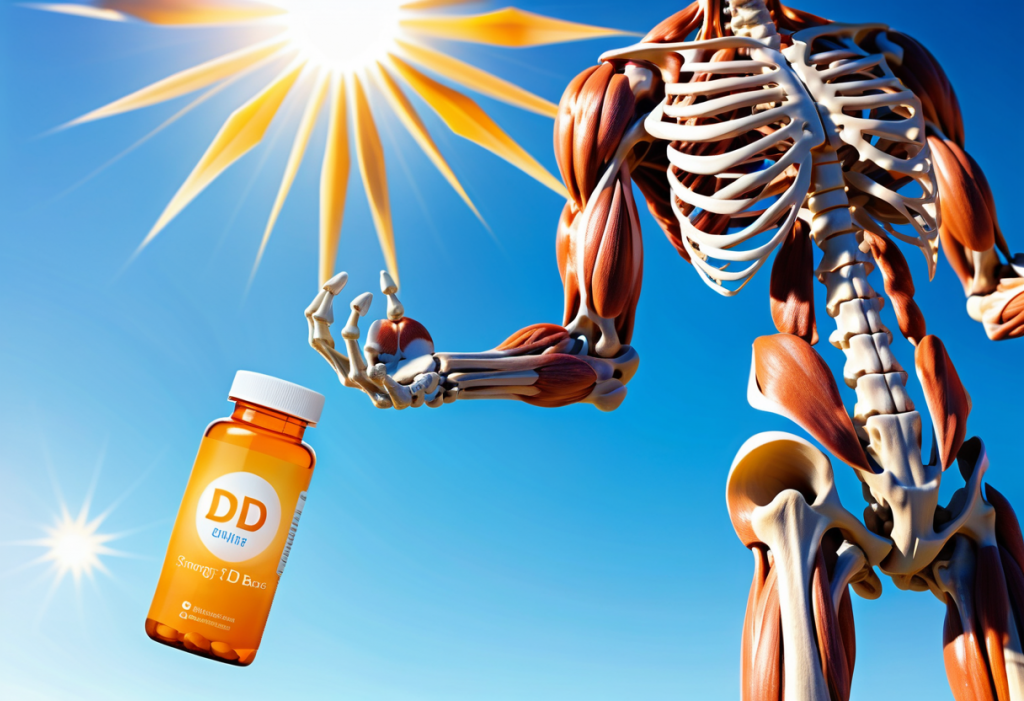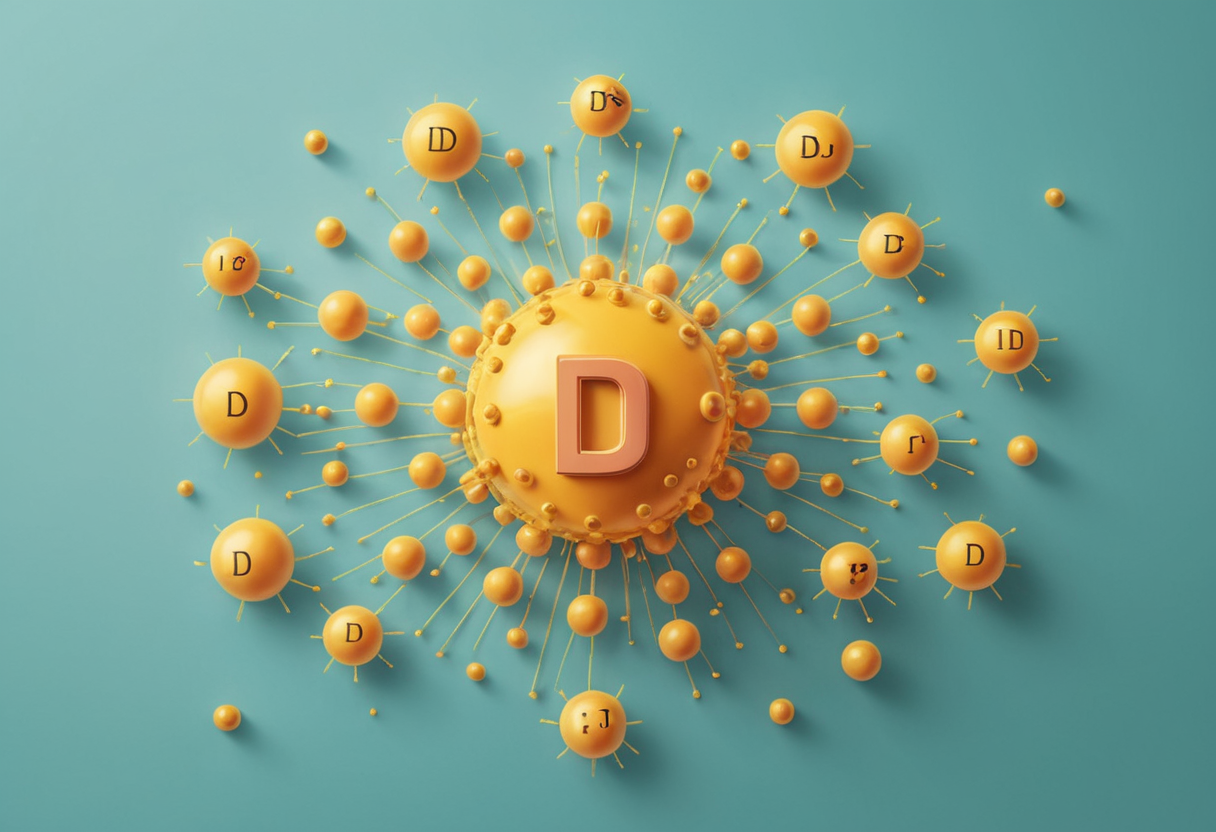
Introduction
Imagine this: you’re always tired, achy, or even feeling down, yet doctors find nothing wrong in your regular check-ups. If this sounds familiar, you might be dealing with a Vitamin D deficiency, a common yet overlooked health issue that can silently affect your well-being. Vitamin D, often called the “sunshine vitamin,” is a vital nutrient for our bodies, essential for maintaining strong bones, a healthy immune system, and even a balanced mood. Here, we’ll explore what Vitamin D deficiency looks like, why it’s so prevalent, and how supplements can be a game-changer for reclaiming your health.
What is Vitamin D, and Why Do You Need It?
Vitamin D isn’t just another vitamin—it’s a powerhouse for your body. Unlike other nutrients, Vitamin D can be produced by our bodies when our skin is exposed to sunlight. Once produced, it plays an essential role in regulating calcium and phosphorus, promoting bone health, supporting the immune system, and even improving mental health. In short, a lack of this vitamin can disrupt various bodily functions and contribute to an array of health issues.
For this reason, Vitamin D is crucial for:
Bone Health: It helps bones absorb calcium, which is vital for bone strength and structure.
Immune System Support: Vitamin D helps your immune cells work optimally, fighting off infections and inflammation.
Mental Health and Mood Regulation: Low levels of Vitamin D have been linked to depression and seasonal mood changes.
Causes of Vitamin D Deficiency: Why is it So Common?
While getting enough Vitamin D seems simple—spend time outdoors, eat the right foods—it’s surprisingly easy to be deficient. Here are some key factors:
1. Limited Sun Exposure
The most natural way to obtain Vitamin D is through sunlight. Yet, lifestyle and location can impact our exposure. Living in colder climates, spending lots of time indoors, or even wearing high-SPF sunscreen can block UV rays and reduce Vitamin D production.
2. Dietary Limitations
Vitamin D-rich foods are relatively rare in the typical diet. Fatty fish, liver, and fortified dairy products are good sources, but vegans and vegetarians might find it challenging to get enough through food alone.
3. Age and Health Conditions
As we age, our skin becomes less efficient at synthesizing Vitamin D. Health conditions affecting the digestive system, like Crohn’s disease or celiac disease, can also limit Vitamin D absorption.
Recognizing the Signs and Symptoms of Vitamin D Deficiency
It’s easy to overlook a Vitamin D deficiency because the symptoms can mimic other health issues. However, recognizing these signs early can prevent complications.
1. Bone Pain and Muscle Weakness
Feeling achy or experiencing muscle cramps? Since Vitamin D plays a key role in calcium absorption, a deficiency can lead to bone pain and weakness. In severe cases, prolonged deficiency can result in Osteomalacia in adults—a condition marked by bone softening.
2. Persistent Fatigue
Low Vitamin D levels can cause fatigue, making even small tasks seem overwhelming. If you’re feeling consistently tired despite rest, this may be an indicator of deficiency.
3. Mood Changes and Depression
Research shows that Vitamin D influences serotonin, the “feel-good” hormone. People with low levels often report mood swings, irritability, or even depression, especially during winter months.
4. Frequent Illness
Vitamin D helps your immune system fight off pathogens. If you’re constantly getting colds, it could mean your body lacks the Vitamin D needed to support immune function.
- You can read more about How Vitamin D Supplements Improve Immune Health: The Ultimate Guide
Health Risks of Ignoring Vitamin D Deficiency
Letting Vitamin D deficiency go unchecked can have severe, long-term effects on your health. Here’s why addressing it is so important:
1. Osteoporosis and Bone Fractures
A deficiency can weaken your bones over time, increasing the risk of osteoporosis and fractures. This is especially concerning for postmenopausal women and older adults, who are already at higher risk.
2. Increased Autoimmune Risks
Studies have shown that low Vitamin D levels may increase susceptibility to autoimmune diseases like multiple sclerosis, rheumatoid arthritis, and type 1 diabetes.
3. Cardiovascular Health
Emerging research suggests a link between Vitamin D deficiency and cardiovascular disease, with higher risks of hypertension and heart-related issues among those with low levels.
4. Cognitive Health and Dementia
Some studies indicate that older adults with low Vitamin D levels are at a greater risk for cognitive decline and dementia.
Consider these recommended high-quality Vitamin D supplements suitable for those with dietary restrictions or limited sun exposure, you can take for Bones, Joints & Immune health:
- Vitamin D Tablets 1000IU, By Vitabiotics Ultra
- Vitamin D3 4000 IU – 400 Tablets
- Vitamin D3 K2 Tablets – 4000IU & 125μg Vitamin K2 – 240 Tablets
- Vitamin D 4000 IU – 500 Tablets
- Zipvit Vitamin D3 4000 IU – 360 Tablets
- Daily Vitamin D3 2000IU – 365 Tablets
How Vitamin D Supplements Could be a Game-Changer

If getting enough Vitamin D naturally is difficult due to lifestyle, diet, or geographic limitations, supplements can make a big difference. Here’s how they can help:
1. Types of Vitamin D Supplements: D2 vs. D3
Vitamin D supplements are available in two forms: D2 (ergocalciferol) and D3 (cholecalciferol). Research indicates that D3 is more effective at raising and maintaining Vitamin D levels in the blood.
2. Dosage and Effectiveness
Most adults need around 600-800 IU per day, though specific needs vary by age, health status, and exposure to sunlight. For those with severe deficiencies, doctors may recommend higher doses initially, then taper to a maintenance level.
3. Convenience and Flexibility
From capsules to liquid drops, there’s a Vitamin D supplement format for everyone. People who have difficulty swallowing pills may prefer chewable tablets, gummies or drops.
Here are some high-quality Vitamin D supplements in different forms listed below:
- Vitamin D Drops for Adults – Vitamin D 4000 IU & Vitamin K2 25mcg
- Vitamin D Drops 90ml for Adults – 1000IU
- Vitamin D Gummies for Adults 4000IU – Sugar-Free
- Vitamin D3 Chewable Gummies – 2000 IU
- Vitamin D 1000IU – Chewable Vegan Gummies
- Vitamin D Gummies for Kids – 1000IU
- Vitamin D3 K2 Oral Spray, Fast Acting
Natural Ways to Prevent Vitamin D Deficiency
Supplements are incredibly helpful, but there are also natural ways to boost Vitamin D levels:
1. Safe Sun Exposure
Spend at least 15-30 minutes in direct sunlight a few times per week, particularly on your face and arms, to stimulate Vitamin D production. However, be cautious with UV exposure, especially if you have sensitive skin.
2. Incorporate Vitamin D-Rich Foods
While Vitamin D isn’t plentiful in many foods. the best food sources of vitamin D are fatty fish (like salmon and mackerel), fortified dairy products. Cod liver oil contains a lot of vitamin D, but pregnant people should not take it. Egg yolks contain small amounts of vitamin D, especially the yolks. For plant-based eaters, fortified almond milk, cereals, and mushrooms are good
3. Maintain a Healthy Weight
Research suggests that excess body fat can interfere with Vitamin D absorption. Staying active and maintaining a healthy weight can improve how your body processes and uses this essential vitamin.
When to Consult a Doctor and Test for Vitamin D Deficiency
If you suspect a Vitamin D deficiency, especially if experiencing persistent symptoms, testing can confirm if supplements are necessary. Here’s how testing works:
1. Blood Tests
Doctors typically order a blood test called the 25-hydroxy vitamin D test. This measures the amount of Vitamin D in your blood, giving an accurate indication of your levels.
2. Understanding Your Results
A level below 20 nanograms per milliliter is considered deficient, while 20-50 ng/mL is adequate for most people. Based on these results, your doctor might recommend a specific supplement dose.
3. Ongoing Monitoring
People at higher risk, like those with chronic health issues or older adults, should get tested regularly to ensure they’re maintaining adequate Vitamin D levels.
You can use Vitamin D test kit at home, this is an ideal tool to manage your levels in-between doctors appointments.
- Vitamin D Level Insufficiency Deficiency Testing Kits (1 Test)
- 2 x Vitamin D Level Insufficiency Deficiency Testing Kits (2 Tests)
- Vitamin D Test Kit Rapid Self-Test Vitamin D Health Test Kit
FAQs About Vitamin D Deficiency and Supplementation
1. Can You Take Too Much Vitamin D?
No, excessive Vitamin D intake can lead to toxicity. Stick to recommended doses unless otherwise advised by your doctor. Vitamin D toxicity can result in hypercalcemia, which can be harmful to kidneys and bones.
2. Do You Need Supplements if You Get Enough Sun?
Some people can maintain adequate Vitamin D levels from sunlight alone, but factors like skin type, latitude, and sun exposure vary widely. Supplements help ensure you meet your needs consistently.
3. What are the Best Types of Vitamin D Supplements?
Most people benefit most from Vitamin D3, as it’s the most effective form for raising blood levels. Look for products that suit your preferences, whether capsules, gummies, or liquid forms.
For more articles check Health Diet Supps


Pingback: 10 Powerful Supplements to Boost Your Metabolism
Pingback: Supplements That Work: 8 Proven Options for Better Health